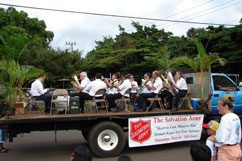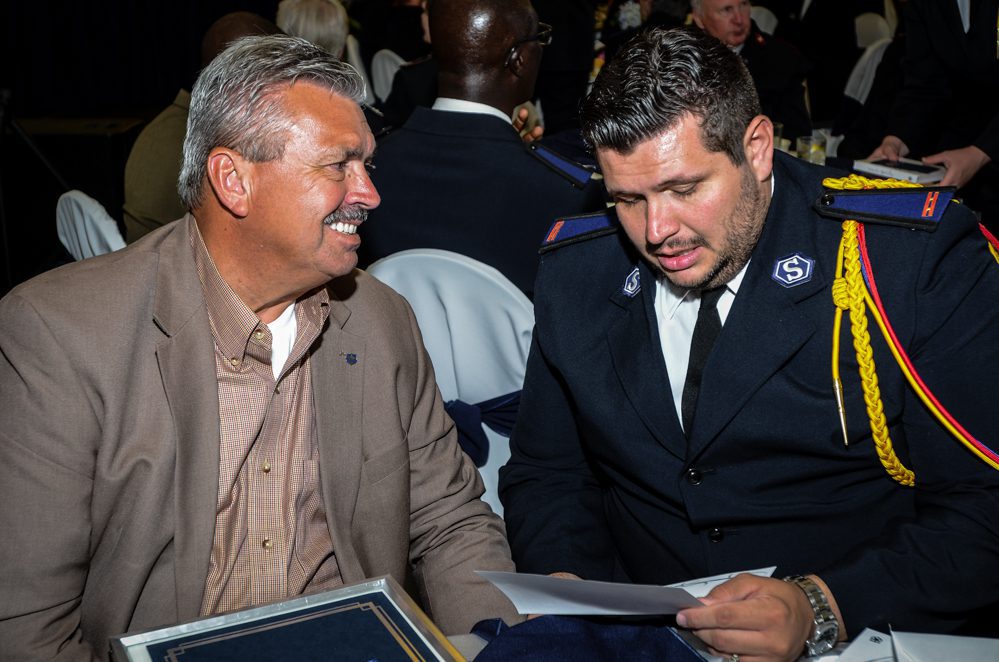Douglas O’Brien, Lt. Colonel
Last spring Los Angeles Lakers forward Metta World Peace got plenty of headlines because of a brutal elbow sweep that caught James Harden in the head. As The Los Angeles Times recorded: Metta World Peace “had just thrown down his third dunk of the game late in the first half, and the 18,997 fans at Staples Center erupted with joy. No one looked more elated than World Peace, who pounded his right fist on his chest. He then cocked his arm back and swung an elbow at Oklahoma City forward James Harden. Harden fell to the ground clutching his ear…The incident earned World Peace a flagrant foul type 2, an immediate ejection and a [seven-day] suspension.”
When World Peace throws a hard elbow he gets a suspension.
I just returned from spending some time with my 3-year-old granddaughter, Brynn, and her family. She’s a lovely girl: bright-eyed, personable, good-looking. She has a beautiful smile.
During my visit, I was interested to see that when Brynn didn’t like me fussing over her, she used her elbow to push me away. She just cocked her elbow and swept me out of the way. It was a reflex action. Evidently, I was an annoyance and she reacted with a firm sweep of her little cocked arm.
I have a pretty standard response to grandkids who push me away. Every time one pushes me away, I start kissing them.
When Brynn throws a hard elbow, I smother her with kisses.
After I do that, her attitude changes. She starts to giggle. Eventually, she pushes me away just so I will keep on kissing her. For grandkids, I think, love and kisses work better than “time out,” a kid-appropriate suspension.
I’ve had other people push me away. When I was in college there was an important woman that I would see at The Salvation Army and at work. She never used her elbow on me, but the way she turned her head away when I was around felt like a body blow. I took her on as a project. When I saw her passing by, I moved to intercept her. She came into a room, I walked over and started talking to her. I used every occasion to speak with her and to give her my attention. In a short time I had made a friend. I knew we were friends the first time she came into a room and I didn’t see her. She saw me. She crossed the room to say hello and ask how I was doing.
There are so many instances in the Gospels where people came over to be close to Jesus. Crowds came to him and pressed in to hear what he had to say. The crowd was so large that Zaccheus had to climb a tree to get close to him. There were those like the suffering woman who came to Jesus hoping to touch his cloak. A centurion asked Jesus just to say something to him so that his servant would be healed. Many people were attracted to Jesus, but not everyone.
Disapproving critics didn’t like the way Jesus kept the ceremonial laws. Others like the rich, young ruler thought a relationship with Jesus would be far too costly. Some put personal priorities over Jesus’ kingdom priorities: “Let me go bury my father first,” said one. Some were disgusted by Jesus’ choice of friends, profoundly unhappy that Jesus would keep company with bad characters.
Jesus never turned them away. With some he seemed to have amazing patience, attending to children or chatting with a Samaritan woman. He did use strong words with some, at least that’s how I would feel if he called me a “blind guide.” In many cases he simply endured their hard elbows and verbal abuse.
But rather than shutting down their relationship with him, Jesus loved them. He loved them whether they loved him or not—and whether they deserved his love or not. When we were still sinners, Christ gave his life for us (Rom. 5:8 BBE). What a wonderful thing if we could respond in love to those who throw elbows at us.
With grandkids, try kisses.













